Trabajadores agrícolas en un rincón remoto del norte de California dicen que nunca han oído hablar de los esfuerzos del estado para ampliar el seguro médico a los residentes indocumentados.
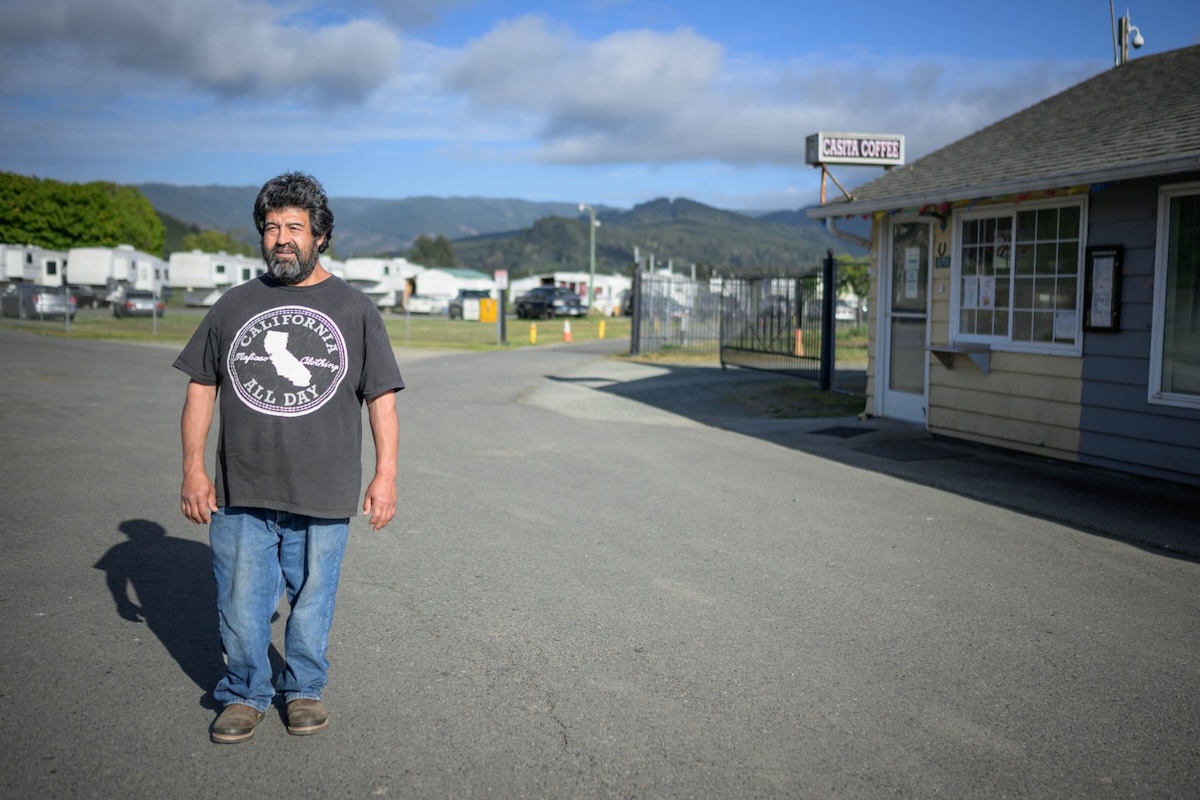
SMITH RIVER, California – Álvaro Urrea Olivares tiene una voz suave y agradable. A sus 45 años, sus curtidas manos revelan décadas de trabajo en los campos de lirios que impulsan la economía local en esta pequeña comunidad del extremo norte de California.
Smith River no es tan sólo una zona rural, dicen sus habitantes, es una zona rural remota, la última frontera de California, y es aquí donde se está poniendo a prueba el plan estatal para expandir el acceso a atención médica a todos los residentes.
“No tengo casa. Aquí me ayudan otras personas. Me ayuda a encontrar trabajo; me dan comida y duermo en mi coche. No es tan malo como los que duermen al aire libre”, explica Urrea, (a quien apodan Caballo), al tiempo que señala un BMW abandonado.
Repleto de mantas y objetos personales, el coche está estacionado en medio de una hilera de remolques que albergan a unos 50 trabajadores agrícolas y sus familias. La inmensa mayoría son originarios de Veracruz, Jalisco o, en el caso de Urrea, Guanajuato. En la entrada del parque hay un cartel amarillo que reza: “Bienvenido a Smith River. Capital mundial del lirio de Pascua”.
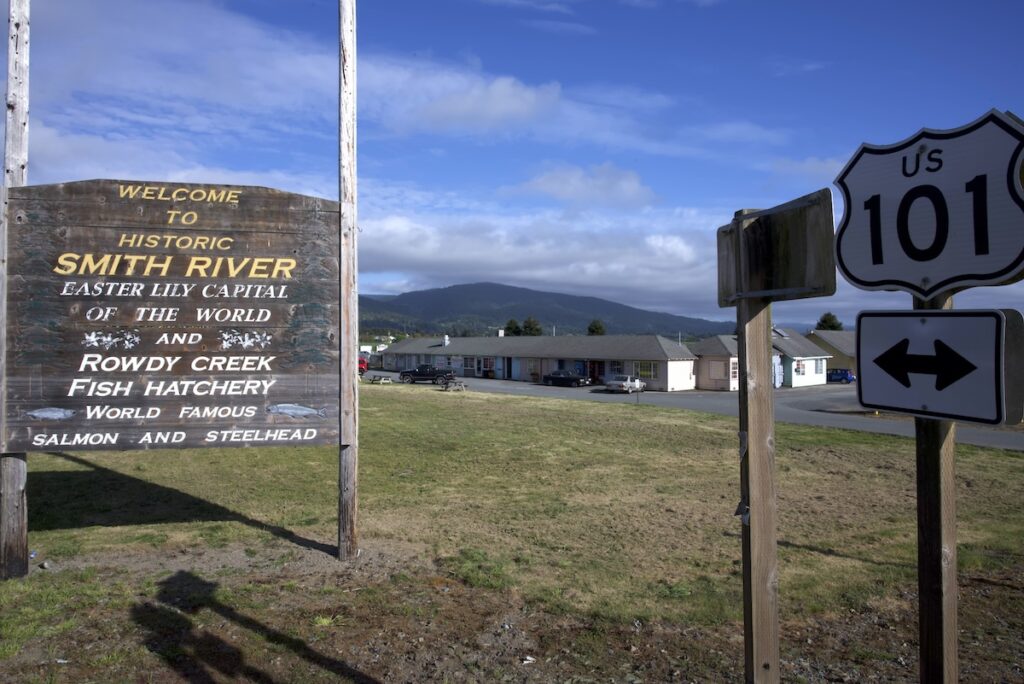
En años pasados, los inmigrantes –muchos de ellos indocumentados– iban y venían con la cosecha de lirios, regresaban a México en otoño y luego volvían a Smith River en primavera para plantar. Pero a medida que se endurecieron las restricciones fronterizas, muchos permanecieron en lo que se ha convertido en una comunidad permanente. Entre la siembra y la cosecha, los residentes recurren a trabajos diarios para sobrevivir.
“Aquí es caro”, continúa Urrea en español. “Cuando la gente no tiene trabajo, no pueden pagar el alquiler. Llevo tres años durmiendo en este coche”.
Manuel Ortiz informa sobre la falta de información sobre la elegibilidad para Medi-Cal disponible para los trabajadores agrícolas en Smith River, condado de Del Norte, para el programa de radio Por la Libre. (Solo en español. Haga clic aquí para leer una transcripción en inglés).
A partir del 1 de enero, California puso Medi-Cal, la versión estatal de Medicaid, a disposición de todos los residentes independientemente de su estatus migratorio. Al mismo tiempo, también ha ampliado drásticamente los servicios de Medi-Cal para incluir ayuda con aspectos como nutrición, salud mental y apoyo a la vivienda, entre otras necesidades.
Sin embargo, la noticia de la expansión aún no ha llegado a los trabajadores agrícolas aquí, muchos de los cuales no tienen seguro y potencialmente calificarían.
“No te enfermes aquí”
“Me enfermé bastante hace unos años. No cubrían mis medicamentos”, dice Urrea, refiriéndose a la clínica a la que acudió para recibir tratamiento en Crescent City, 15 millas al sur. “Hoy en día no tengo mucho trabajo y no tengo dinero para pagar. Entonces compro pastillas en la tienda cuando me enfermo”.
Pastillas en la tienda. Es una frase que se escucha de otros residentes del campamento de casas rodantes cuando se les pregunta sobre su salud.
“No sé cómo conseguir un seguro”, dice Tino (que no quiso dar su apellido). Tino, de unos 30 años, ha vivido aquí en uno de los remolques durante dos años. “Me enfermé hace tres meses y solo tomé unas pastillas”. Y añade: “Somos latinos, inmigrantes… No es fácil para nosotros conseguir un seguro”.
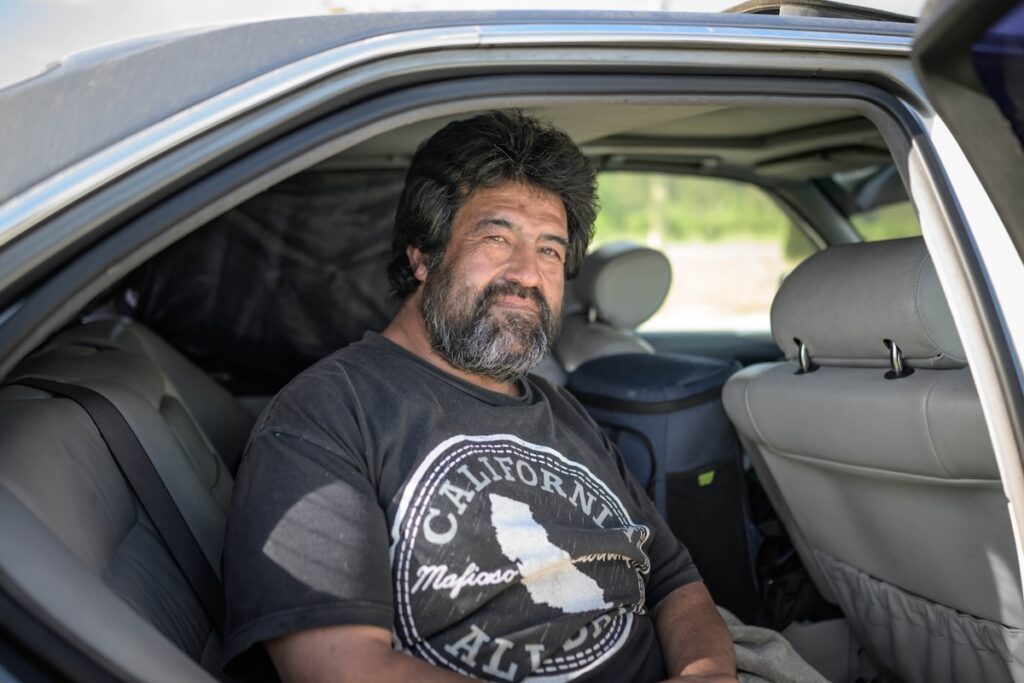
Smith River está ubicado en el extremo noroeste del condado de Del Norte, un rincón escasamente poblado del norte de California entre el condado de Humboldt al sur, la frontera de Oregón al norte, extensos bosques al este y el Pacífico al oeste. Los latinos aquí representan sólo 20 por ciento de la población general (que es mayoritariamente blanca, con una importante presencia de nativos americanos), aunque constituyen la gran mayoría de la fuerza laboral agrícola de la región.
Y como en muchas comunidades aquí, existe (al menos entre los trabajadores agrícolas entrevistados para este artículo) una desconfianza instintiva hacia el gobierno. No dependas del estado. Si te enfermas, depende de ti. O, como comentó un residente, “mejor no te enfermes aquí”.
Haciendo correr la voz
Kathleen Moreno dirige la extensión y la inscripción del Open Door Community Health Center, que opera 12 clínicas en Del Norte y los condados vecinos de Humboldt.
“Hay personas que no han tenido acceso a atención médica desde que están aquí”, dice, “y por eso algunas de sus condiciones de salud son aterradoras y están fuera de control”.
Como centro de salud calificado a nivel federal (FQHC), Open Door es una de las casi tres docenas de organizaciones en 48 de los 58 condados de California que forman parte del Proyecto de Inscripción de Salud de Navigators, lanzado por el Departamento de Servicios de Atención Médica de California (DHCS) para ayudar a obtener el informar sobre la elegibilidad para Medi-Cal a las comunidades locales. La iniciativa estará vigente hasta mediados de 2026.
Hacer eso en lugares como Del Norte, donde las distancias son largas y los recursos pocos, no está exento de desafíos.
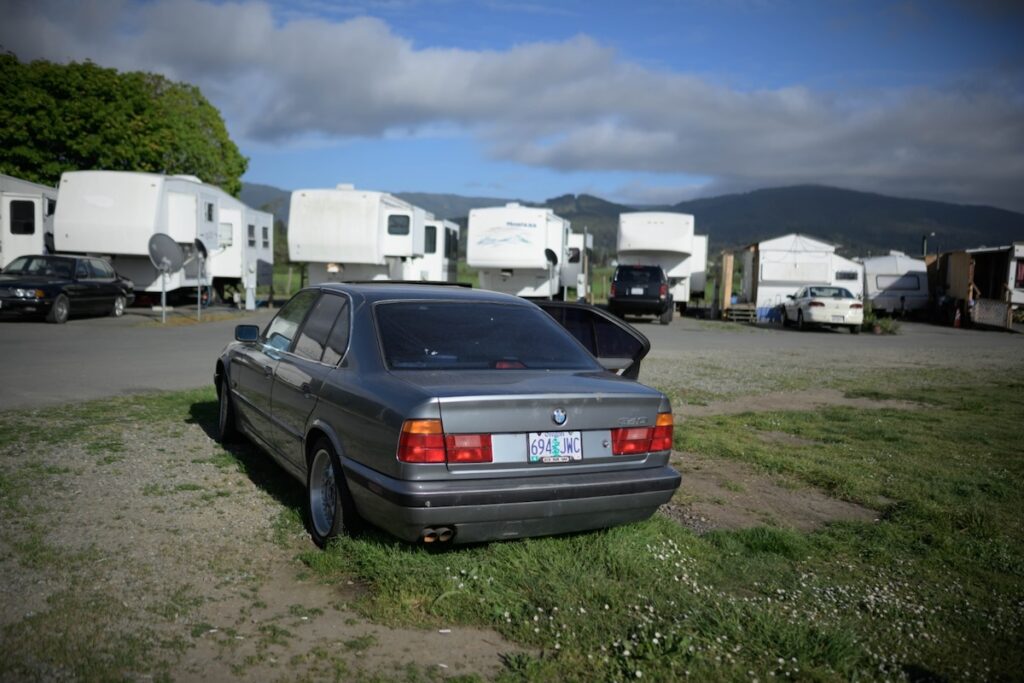
“Aquí arriba no hay un canal fácil de comunicación”, dice Moreno, que vive en Crescent City. No hay estaciones de radio locales en español, ni periódicos, y el acceso a Internet es limitado en algunas áreas, señaló. “Ha sido así desde que vivo aquí hace 18 años”.
Open Door se basa en publicaciones informativas en plataformas como Facebook, presentaciones en ferias de salud locales y eventos comunitarios, y trabajadores de salud comunitarios, también conocidos como Coordinadores de Salud Latinos, de los cuales dos cubren Del Norte y tres para todo Humboldt.
Moreno supervisa su trabajo. “Su éxito se ha basado en gran medida en la confianza y las referencias de boca en boca… una vez que una familia se da cuenta de que puede confiar en nuestros coordinadores, se lo dice a su familia”.
Pero ir directamente a las granjas ha sido un desafío, dice Moreno. “Obviamente, no podemos impedir el trabajo y los propietarios de las granjas no estaban entusiasmados de tener gente en las granjas. Entonces, publicamos en las salas de descanso y trajimos un refrigerio saludable para que todos pudieran entrar y charlar. Pero las pausas para el almuerzo son cortas (media hora) y luego regresan al trabajo”.
Open Door también escaneó los registros de pacientes de 2022 y 2023 para ver quiénes habían accedido a atención médica anteriormente pero no tenían seguro. Estas personas estaban inscritas en Medi-Cal de emergencia y ahora son elegibles para Medi-Cal de alcance completo bajo la expansión actual, aunque es posible que muchos no estén al tanto de este hecho, reconoce Moreno.
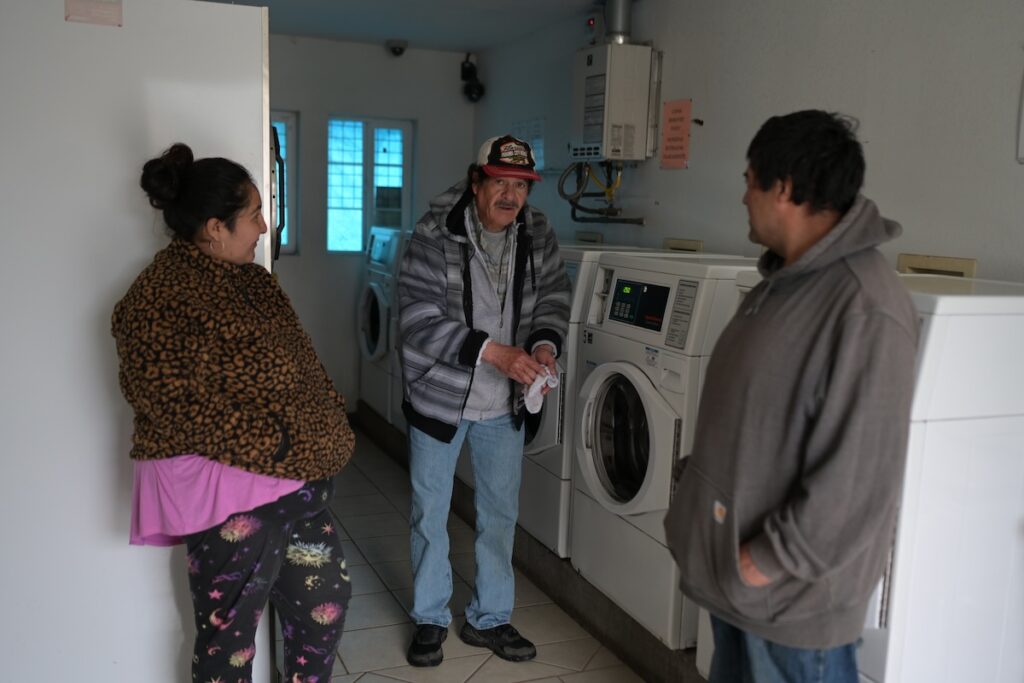
Otra barrera clave es la falta de transporte público. La clínica más cercana a Smith River está en Crescent City. Para necesidades médicas graves, los pacientes deben viajar hasta Redding, un viaje de cuatro horas hacia el sur, o San Francisco, un viaje de seis horas.
También faltan proveedores. “Es realmente difícil encontrar proveedores que quieran vivir y trabajar en Crescent City. A veces encontramos un gran proveedor y se queda. La mayoría de las veces, se van”, dice Moreno, señalando que solo hay un oftalmólogo en Crescent City que atiende pacientes de Medi-Cal, y su lista de espera está al máximo.
La política aumenta la desconfianza, ya que los residentes indocumentados tienen que sopesar sus necesidades de atención médica con el temor de despertar un sentimiento antiinmigrante y poner en peligro su camino hacia la ciudadanía o la residencia legal al acceder a beneficios públicos, que bajo la administración anterior podrían ser motivo de deportación.
“Eso es algo real que preocupa a la gente”, dice Moreno. “Escuchamos a una persona que dijo: ‘Si mi información se divulga y me deportan, al menos tendré acceso a atención médica’”.
“Tienes que cuidarte”

De vuelta en Smith River, los residentes del parque de casas rodantes a veces desconocían y estaban inseguros acerca de la expansión actual de Medi-Cal.
“Nunca había oído hablar de Medi-Cal”, dice Alberto Hernández, originario de Chiapas y residente aquí durante los últimos 11 meses. Cuando se le pregunta qué hace cuando se enferma, se encoge de hombros. “No lo sé… aquí es muy caro. Quizás regresar a México”.
Anancio Hernández trabaja como chef local. “Hace uno o dos meses tuve algunos dolores. Pero seguí trabajando, aunque estaba enfermo”, dice. “No tengo seguro, así que no fui al hospital”. Cuando se le preguntó si se inscribiría en Medi-Cal si tuviera la oportunidad, asintió. “Iré a investigarlo para ver si existe esta oportunidad”.
Por su parte, Urrea comparte que su madre, quien también vive en Del Norte, fue hospitalizada recientemente luego de sufrir un derrame cerebral. Ella perdió la vista en su ojo izquierdo, dice. Al igual que él, ella no tiene seguro.
Y si bien su cariño por la comunidad y la región es claro (está ansioso por mostrar a los visitantes las playas locales, donde dice que a veces va para aclarar sus ideas), tiene la vista clara sobre los desafíos.
“Cuando estás muriendo, tienes que cuidarte a ti mismo. Eso es lo malo de aquí”.
Información adicional de Manuel Ortiz.
Este es el segundo de una serie que analiza la expansión de Medi-Cal en el norte rural de California. Puedes leer la primera parte aquí. Este proyecto es una colaboración entre EMS y Península 360 Press y fue financiado por el Fondo de Impacto de Equidad en Salud de California 2024 del Centro Annenberg de Salud de la USC.
Te puede interesar: Aprueban casi $6 millones a viviendas para trabajadores agrícolas en San Mateo

